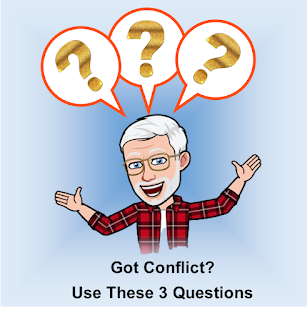How To Easily Manage Conflict With Golden Questions
Tip: How To Easily Manage Conflict With Golden Questions
When your conversation needs to get past debating who’s right and wrong, golden questions can transform the conversation from limitations to possibilities.
Key Takeaway: You Can Build Your Conflict Resolution Skills
Instead of getting stuck on the problem, golden questions explore new perspectives and creative solutions. Imagine you are in a meeting that gets stuck when two opposing views become the focus of the conversation. Transformative communication encourages finding a solution that both sides can live with. But, how do you discover what this new option might be?
Ask Golden Questions
These questions help reshape perspectives and promote
flexibility because they cause the parties to stop and think about three
things: “What do I need (not just want)?” “What does the other party need?” and
“What is a solution that can work for both of us?”. Use these three questions
to radically shift a conflicted conversation:
"What is your greatest
concern?" This helps you understand the other party's core issues. As
appropriate, ask for the need they have that is behind their rhetoric and
demands.
"What do you most want to see
happen?" This shifts the conversation from the past to a future focus—one
that considers desired outcomes and future possibilities. As appropriate, ask
for the next step that would be productive, even if it does not resolve the
whole dispute.
"What do you most want the other person to understand?" This encourages understanding and empathy between the arguing parties. As appropriate, repeat back what you heard each person say so the other party hears it twice.
Facilitate a Resolution to the Conflict
Then, when you start getting answers, defer any instinct you have to provide solutions. Instead, encourage the arguing parties to find their own solutions. Do this by facilitating a two-part conversation.
First, have all the parties offer answers to the same golden questions using a one-person-speak-at-a-time ground rule.
And second, after that lead a brainstorming conversation where each party answers another question (actually a modification of the second golden question): "What do you most want to see happen that will work for you and everyone else at the same time?”
Keep good notes. These answers are your source of common ground. When appropriate, you should summarize these points of agreement and asking the parties to confirm their support for these decisions.
Empower Yourself to Navigate Future Conflicts and Demonstrate Leadership at
the Same Time
By using transformative communication tools you gain the
skills to handle future conflicts independently. But because these skills are
often absent in others, using golden questions also is a valuable leadership
skill. This is particularly valuable for professionals and professors who face
disagreements on a regular basis.
______
Click here to listen to the podcast where this material originated.
Free Consultation - Just Ask!
I offer free consultations on conflict, facilitation,
difficult meetings, public involvement, online meetings, and collaboration in
general. Schedule an opportunity to talk with me about your issue. I promise to
not trap you into a marketing message. We will stick to problem-solving on your
issue.
Click for Appointment
Contact Us:
Michael Fraidenburg
Olympia, WA, USA.
Email Mike
Copyright 2024 Michael E. Fraidenburg




